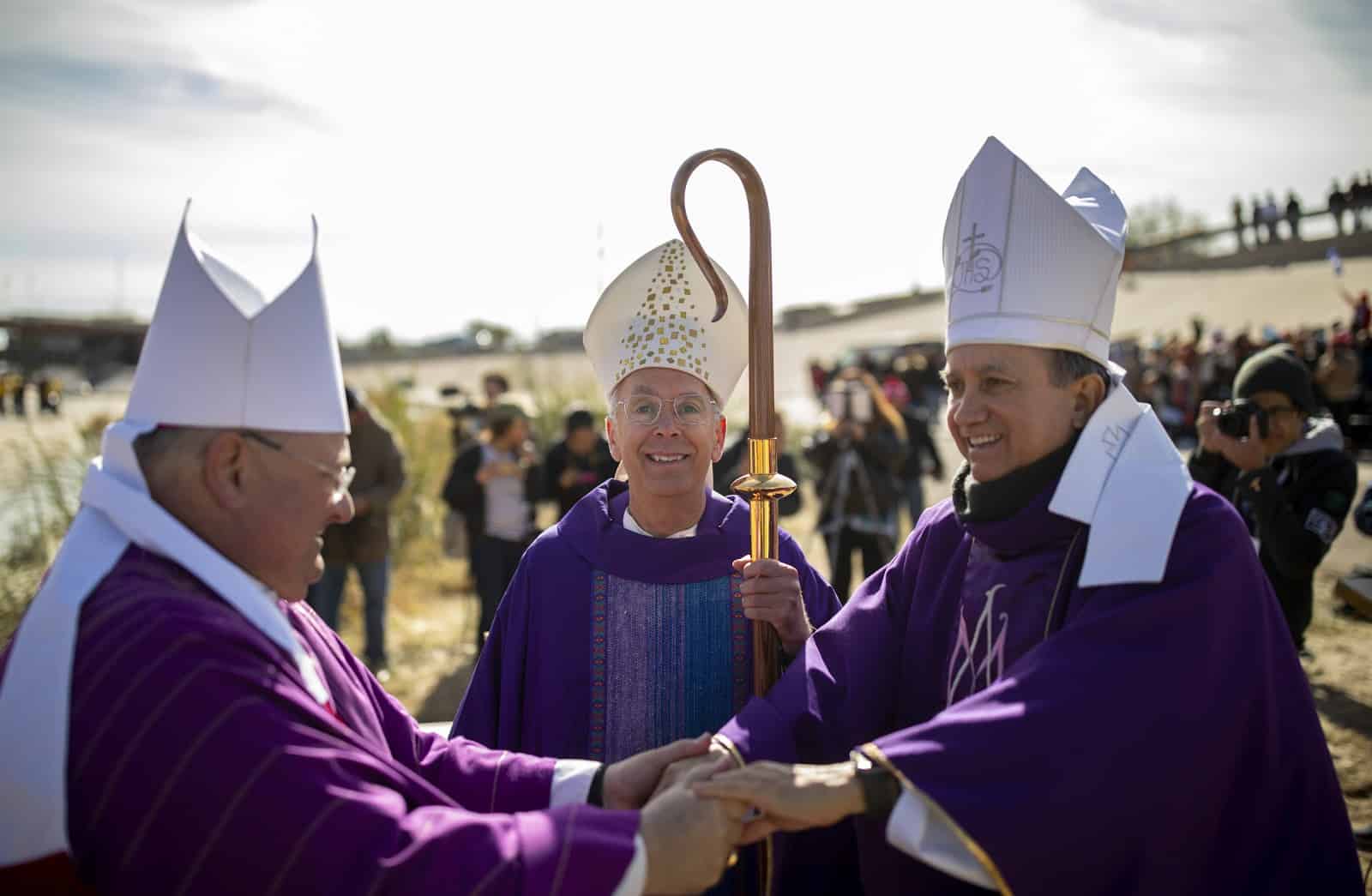The USCCB is currently meeting in Baltimore, where they will deliberate among other things about who they want to lead them. Still more, they will deliberate over how they want their leadership to confront the pressing issues of our time.
As they do so, I hope they pray over the example of three of their brother bishops last week at the border. Last week three bishops, including one from Mexico, offered a powerful counter-witness to the turmoil surrounding immigration at the southern border. Bishops Peter Baldacchino, Mark Seitz, and Jose Guadalupe Torres Campos celebrated mass on the border between the United States and Mexico. The Mass was not near the border, nor in a nearby parish, but on the border itself: right over the Rio Grande river.
It’s the same place that has been pathologized in the nation’s political discourse, accompanied by major policy changes. It’s the space that’s become a touchstone for the nation’s politics, media coverage over the past two years, and, most importantly, the marker across which many hope to cross. That’s where we had Mass.
The liturgy there was not for the government, nor for anyone who might wield the area as a platform for political ascendency. It was for the binational and tri-state (New Mexico, Texas, Chihuahua) community taken hostage by people who do not know them. And because it was All Souls day, the Mass was especially for the many who have died trying to reach this river and find a new life.
Two things were surprising for me. The first surprise was how rapidly the border is changing. In my memory, it was a part of the background where my life took place, a bridge I crossed regularly during my childhood in the Rio Grande Valley. Now it has become a place where families are separated, where detention centers earn infamy for inhumane conditions.
The second surprise had to do with God. And God is always surprising.
Christ is always surprising when walking toward the nerve of conflict. The Father is surprising in anointing the mission of Jesus. The way Christ walks toward conflict and pain is wondrous. I found myself surprised like this many times during my recent, brief visit to El Paso. The three bishops, one of whom recently wrote a remarkable pastoral letter on racism and another on migration, consecrated the Eucharist, for both countries, in a site that has been a place of disappointment for people coming, of fear for those supporting a militarization of the area, and of mission for those dedicated to relief efforts.
I met people dedicated to helping migrants who renewed my wonder at the way Jesus approaches a margin. Several were attorneys. I met a Jesuit who represented the Jesuit Refugee Service at the United Nations in Geneva and was the program’s director in Zambia. Before, when he lived in El Paso, he provided legal assistance to battered women from Mexico.
I met an attorney who works for the Diocese’s Migration and Refugee Services. As a child, her mother was in the process toward being deported, until they went to the Diocese for help. Now she’s a part of that help, someone who knows immigration law through and through.
I met an immigration attorney who is a Maryknoll Lay Missioner and works on asylum cases as a part of Las Americas Refugee Asylum Project. When I asked what gave her hope and where she finds God, she said, “Where don’t I find God?” Then she reiterated what someone told her. A mother and daughter, traveling through Guatemala and Mexico, told her, “there’s always someone willing to share food with you. We never went hungry.”
I think the presence of one thing decides whether or not you can look at the border without despair: a love made personal for the people that are seeking to cross, and a love for the people of El Paso and Juarez that continue to do what they can to help. That love was palpable in the people who are on the ground giving their lives to those whose stories echo the ones we’ve heard in the headlines.
Both those who risk everything to cross and those who work to help them wear a courage that’s hard to miss. It’s reminiscent of Thomas Aquinas’s description of courage: “strength in hope.”
If you lose hope that the situation at the border can improve, it would be because you haven’t really seen this binational community: a community who suffered a hate crime that claimed twenty-two lives and yet continues to give to those who have nothing.
Without seeing how lovable the people on the border are, how much hope enlivens the courage of those seeking to cross, you miss everything. You miss the faces of the people who, like Abraham, risked their lives by leaving their home, yearning to be “free to worship him without fear” (Lk 1:74).
Without hope, you might not notice a story like the one Fr. Rafael Garcia told me, a Jesuit priest who is a chaplain at several of the ICE detention centers. He says Mass at a hybrid shelter-detention facility for unaccompanied minors. A boy among them asked for baptism and first communion. Not too long after, this kid, living in the facility, was driven to Sacred Heart Catholic Church along with some of the other children. They had a Mass there, and everything that we believe that happens under the signs of the sacraments happened. Among a group of unaccompanied minors in custody, one was baptized and received his first communion. And then they celebrated with cake in the rectory.
I hope you see something beautiful in that, because this kid did.
Appropriately, the second reading for the border Mass was from the first letter of John: “See what love the Father has bestowed on us that we may be called the children of God. Yet so we are. The reason the world does not know us is that it did not know him” (1 Jn. 2:1).
To the extent that you do not know Jesus Christ, you do not know these people, many of whom have fled for fear of their lives, but keep hoping. Nor would you know the people spending their lives to help, and encountering the face of God.
In a time when the nation’s eyes are on the border, the U.S. Bishops have an opportunity to keep their eyes on the faces of the people who are often neglected. After my trip to the border, I pray they do so. I pray they demonstrate courage made bold by hope.


